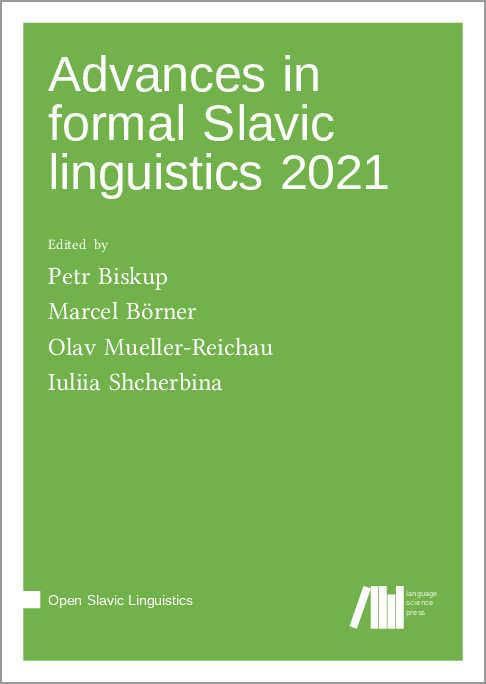In der letzten Zeit sind u.a. diese frei verfügbaren Titel erschienen:
Advances in formal Slavic linguistics 2018 & 2021
Petr Biskup, Marcel Börner (né Guhl), Olav Mueller-Reichau & Iuliia Shcherbina (Hrsg.)
https://langsci-press.org/catalog/book/411
https://doi.org/10.5281/zenodo.10078020
Advances in formal Slavic linguistics 2021 offers a selection of articles that were prepared on the basis of talks given at the conference Formal Description of Slavic Languages 14 or at the satellite workshop on secondary imperfectives in Slavic, which were held on June 2–5, 2021, at the University of Leipzig. The volume covers all branches of Slavic languages and features synchronic as well as diachronic analyses. It comprises a wide array of topics, such as degree achievements, clitic climbing in Czech and Polish, typology of Slavic l‑participles, aspectual markers in Russian and Czech, doubling in South Slavic relative clauses, congruence and case-agreement in close apposition in Russian, cataphora in Slovenian, Russian and Polish participles, prefixation and telicity in Serbo-Croatian, Bulgarian adjectives, negative questions in Russian and German and imperfectivity in discourse. The numerous topics addressed demonstrate the importance of Slavic data and the analyses presented in this collection make a significant contribution to Slavic linguistics as well as to linguistics in general.
Die Bände 2016, 2017 und 2018 sind ebenfalls bei Language Science Press erschienen.
Compiling and annotating a learner corpus for a morphologically rich language: CzeSL, a corpus of non-native Czech
Tomáš Jelínek, Barbora Štindlová, Alexandr Rosen, Svatava Škodová, Jiří Hana & Barbora Vidová Hladká https://karolinum.cz/knihy/rosen-compiling-and-annotating-a-learner-corpus-for-a-morphologically-rich-language-23802
https://directory.doabooks.org/handle/20.500.12854/43652.2
Learner corpora, linguistic collections documenting a language as used by learners, provide an important empirical foundation for language acquisition research and teaching practice. This book presents CzeSL, a corpus of non-native Czech, against the background of theoretical and practical issues in the current learner corpus research.
Languages with rich morphology and relatively free word order, including Czech, are particularly challenging for the analysis of learner language. The authors address both the complexity of learner error annotation, describing three complementary annotation schemes, and the complexity of description of non-native Czech in terms of standard linguistic categories.
The book discusses in detail practical aspects of the corpus creation: the process of collection and annotation itself, the supporting tools, the resulting data, their formats and search platforms.
The chapter on use cases exemplifies the usefulness of learner corpora for teaching, language acquisition research, and computational linguistics. Any researcher developing learner corpora will surely appreciate the concluding chapter listing lessons learned and pitfalls to avoid.
Patriotismus im Deutschen und Polnischen: Eine framebasierte Analyse
Magdalena Szulc-Brzozowska
https://doi.org/10.25162/9783515134873
Die Monografie stellt eine framesemantische Beschreibung des Patriotismus im Deutschen und Polnischen dar, und zwar eine einzelsprachliche Erfassung des Frames sowie Ergebnisse einer kontrastiven Analyse. Das Untersuchungskorpus besteht aus deutschen und polnischen Printmedien mit einem breiten ideologischen Spektrum: von links über liberal bis rechtskonservativ und katholisch. Den theoretisch-methodologischen Hintergrund bilden Framesemantik, Diskurslinguistik und kognitive Ethnolinguistik. Die Untersuchung konzentriert sich auf die Standardwerte des Frames, die dem Stereotyp in der kognitiven Ethnolinguistik entsprechen, und auf bestimmte ideologische Profilierungen des Stereotyps. Die kontrastive Analyse dient der Verdeutlichung diverser Diskurspositionen und Argumentationstopoi in ideologischer, aber auch in sprach- und kulturbezogener Hinsicht. Die Diskursanalyse deckt den für den Diskurs spezifischen Wortschatz, darunter saliente Konzepte, mit dem Status der Schlagwörter auf. Im Ergebnis kommen die Strukturierung des Diskurses mittels diskurssemantischer Grundfiguren sowie die Problematik der Enttabuisierung des Patriotismus in den beiden Kulturgemeinschaften zum Vorschein.


